中考英语语法考点总结——主谓一致(共20张PPT)
文档属性
| 名称 | 中考英语语法考点总结——主谓一致(共20张PPT) |  | |
| 格式 | ppt | ||
| 文件大小 | 2.6MB | ||
| 资源类型 | 试卷 | ||
| 版本资源 | 通用版 | ||
| 科目 | 英语 | ||
| 更新时间 | 2022-04-10 18:56:32 | ||
图片预览

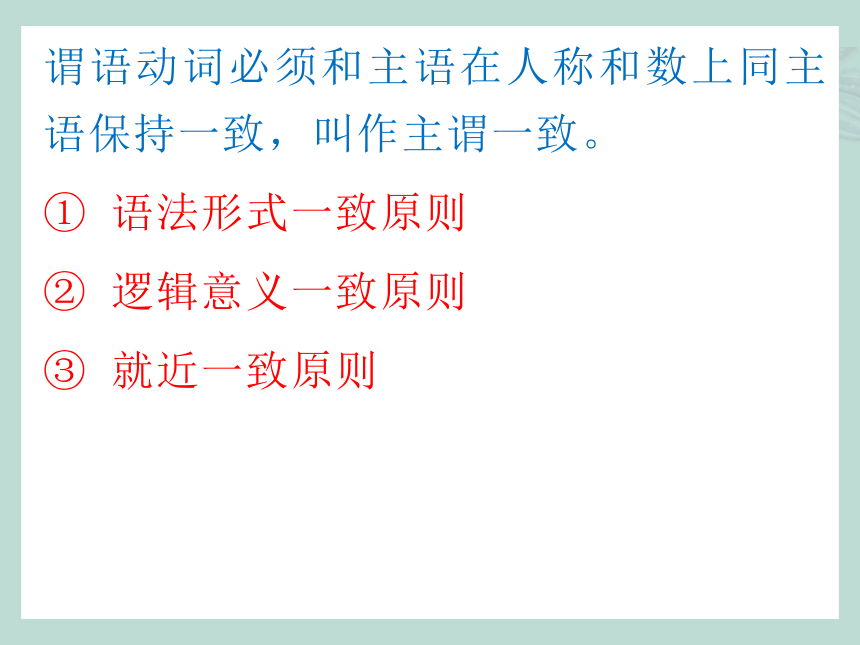
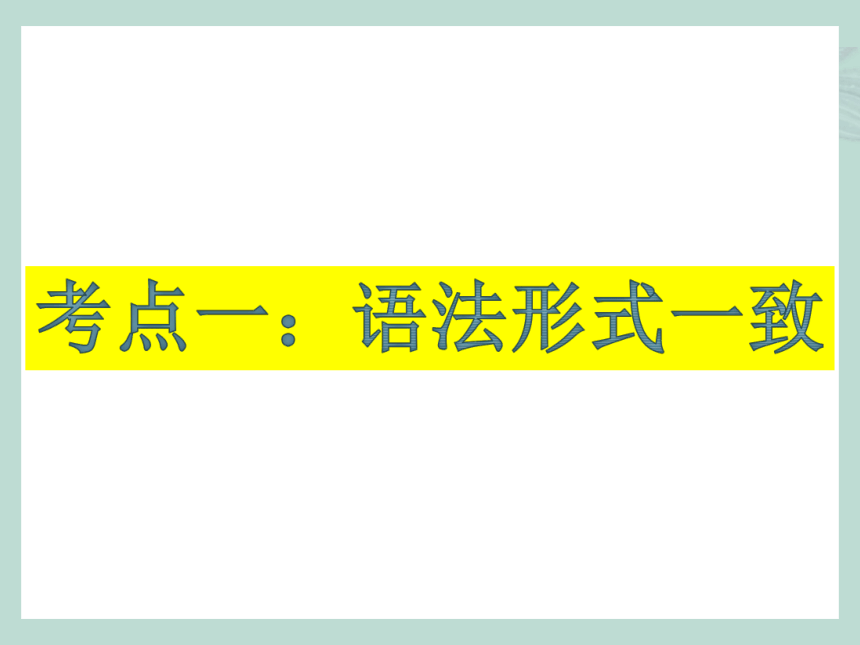
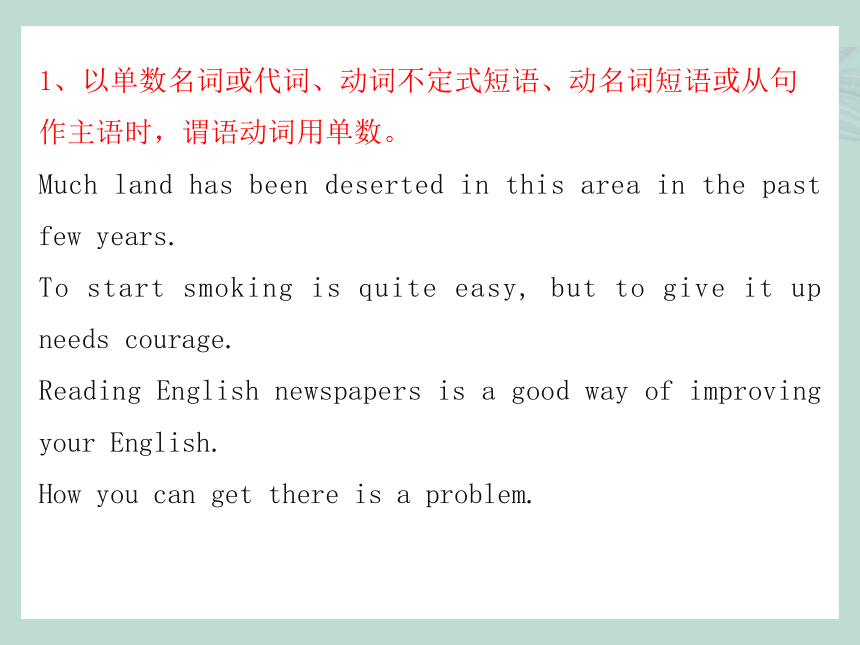
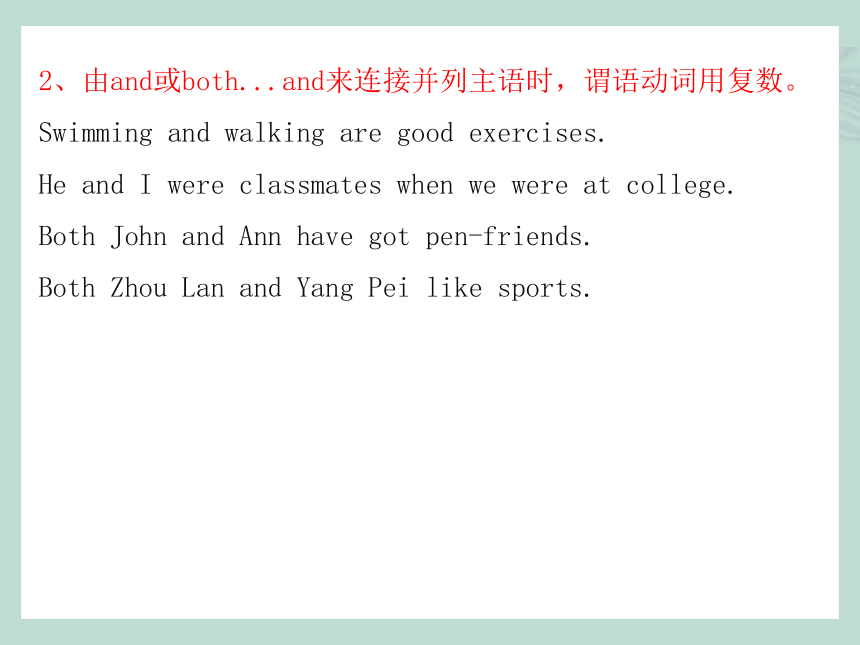
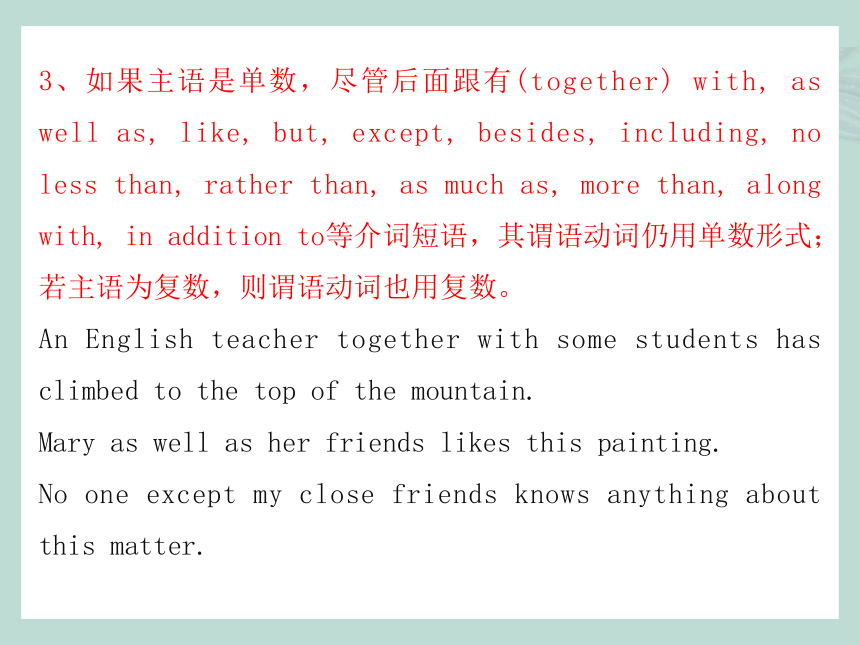
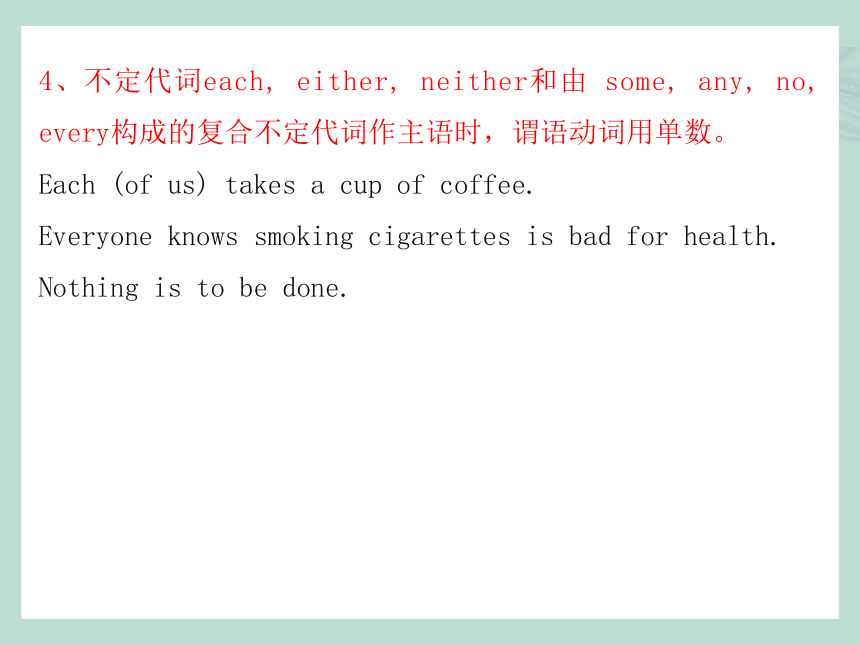
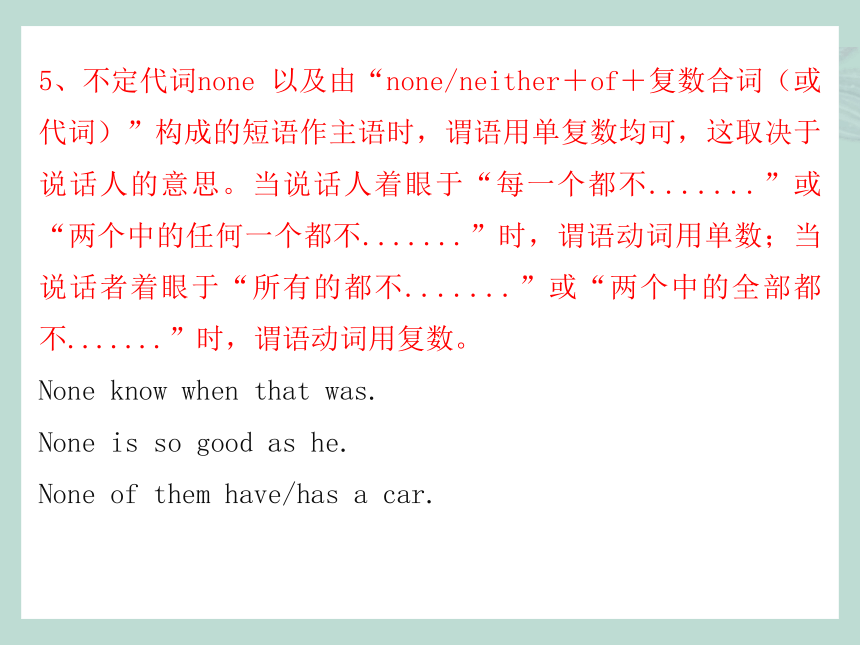
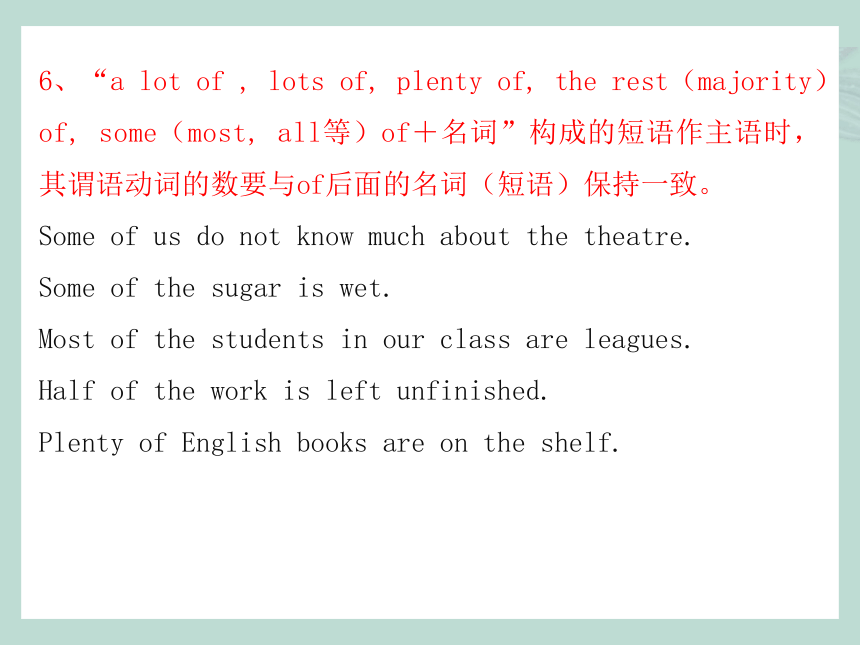
文档简介
(共20张PPT)
主谓一致
谓语动词必须和主语在人称和数上同主语保持一致,叫作主谓一致。
① 语法形式一致原则
② 逻辑意义一致原则
③ 就近一致原则
1、以单数名词或代词、动词不定式短语、动名词短语或从句作主语时,谓语动词用单数。
Much land has been deserted in this area in the past few years.
To start smoking is quite easy, but to give it up needs courage.
Reading English newspapers is a good way of improving your English.
How you can get there is a problem.
2、由and或both...and来连接并列主语时,谓语动词用复数。
Swimming and walking are good exercises.
He and I were classmates when we were at college.
Both John and Ann have got pen-friends.
Both Zhou Lan and Yang Pei like sports.
3、如果主语是单数,尽管后面跟有(together) with, as well as, like, but, except, besides, including, no less than, rather than, as much as, more than, along with, in addition to等介词短语,其谓语动词仍用单数形式;若主语为复数,则谓语动词也用复数。
An English teacher together with some students has climbed to the top of the mountain.
Mary as well as her friends likes this painting.
No one except my close friends knows anything about this matter.
4、不定代词each, either, neither和由 some, any, no, every构成的复合不定代词作主语时,谓语动词用单数。
Each (of us) takes a cup of coffee.
Everyone knows smoking cigarettes is bad for health.
Nothing is to be done.
5、不定代词none 以及由“none/neither+of+复数合词(或代词)”构成的短语作主语时,谓语用单复数均可,这取决于说话人的意思。当说话人着眼于“每一个都不.......”或“两个中的任何一个都不.......”时,谓语动词用单数;当说话者着眼于“所有的都不.......”或“两个中的全部都不.......”时,谓语动词用复数。
None know when that was.
None is so good as he.
None of them have/has a car.
6、“a lot of , lots of, plenty of, the rest(majority)of, some(most, all等)of+名词”构成的短语作主语时,其谓语动词的数要与of后面的名词(短语)保持一致。
Some of us do not know much about the theatre.
Some of the sugar is wet.
Most of the students in our class are leagues.
Half of the work is left unfinished.
Plenty of English books are on the shelf.
7、由“分数或百分数+of +名词(或代词)”构成的短语作主语时,其谓语动词的数要与of后面的名词(短语)保持一致。Two thirds of the country is dry or desert.
Two thirds of the people present are against the plan.
More than 70 percent of the surface of our earth is covered by water.
1、表示总称意义形单意复的名词,如people, police, cattle等作主语时,只当作复数看待,谓语在任何情况下都用复数。
The cattle are one cause of the problem.
The police are searching for a murderer in that mountain.
2、以army, class, enemy, family, government, group, team,crew, crowd, public等集体名词作主语时,谓语应视其情况而用不同形式:当作主语被看作一个整体时,谓语用单数,如果被看成是其中的个体成员时,谓语就用复数。
Our class is better than any other class at playing basketball in our school.
Our class are playing a basketball match tomorrow.
Our family is not poor any more.
My family all speak the Intuit language.
3、当一些有两部分构成的表示衣物或工具的名词作主语时,谓语动词通常用复数形式,如glasses(眼镜), trousers(裤子), shoes(鞋子),chopsticks(筷子), goods(货物), scissors(剪刀), socks(袜子), compasses(圆规),但如果这些名词前有a pair of等量词修饰时,谓语动词一般用单数形式。
Your trousers need washing.
My glasses are new.
A pair of compasses is an instrument for drawing circles.
Two pairs of socks are enough for me.
4、由“pair, piece of +名词/代词”作主语时,谓语动词与pair, piece等词保持一致与后的代词、名词无关。
There is a pair of shoes left.
The pieces of stone were then carried to the new place for the temple.
5、当表示时间、金钱、距离、重量、长度、价值等数词短语作主语时,根据意义一致原则,通常被看作一个整体,其谓语用单数。
Twenty years is a long time to us.
One thousand pounds is a lot of money.
1、当or, either...or, neither...nor, not only...but also..., not...but...., whether...or...等连接两个并列主语时,谓语动词单复数取决于最靠近于它的名词或代词。
Either you or Lily is to do the cleaning after supper.
Not only the mother but also the children were there.
2、当There be句型后面有两个或两个以上的名词时,be动词要和最靠近它的那个名词在人称和数上保持一致。
There is a pen and two books on the table.
=There are two books and a pen on the table.
THANK YOU
主谓一致
谓语动词必须和主语在人称和数上同主语保持一致,叫作主谓一致。
① 语法形式一致原则
② 逻辑意义一致原则
③ 就近一致原则
1、以单数名词或代词、动词不定式短语、动名词短语或从句作主语时,谓语动词用单数。
Much land has been deserted in this area in the past few years.
To start smoking is quite easy, but to give it up needs courage.
Reading English newspapers is a good way of improving your English.
How you can get there is a problem.
2、由and或both...and来连接并列主语时,谓语动词用复数。
Swimming and walking are good exercises.
He and I were classmates when we were at college.
Both John and Ann have got pen-friends.
Both Zhou Lan and Yang Pei like sports.
3、如果主语是单数,尽管后面跟有(together) with, as well as, like, but, except, besides, including, no less than, rather than, as much as, more than, along with, in addition to等介词短语,其谓语动词仍用单数形式;若主语为复数,则谓语动词也用复数。
An English teacher together with some students has climbed to the top of the mountain.
Mary as well as her friends likes this painting.
No one except my close friends knows anything about this matter.
4、不定代词each, either, neither和由 some, any, no, every构成的复合不定代词作主语时,谓语动词用单数。
Each (of us) takes a cup of coffee.
Everyone knows smoking cigarettes is bad for health.
Nothing is to be done.
5、不定代词none 以及由“none/neither+of+复数合词(或代词)”构成的短语作主语时,谓语用单复数均可,这取决于说话人的意思。当说话人着眼于“每一个都不.......”或“两个中的任何一个都不.......”时,谓语动词用单数;当说话者着眼于“所有的都不.......”或“两个中的全部都不.......”时,谓语动词用复数。
None know when that was.
None is so good as he.
None of them have/has a car.
6、“a lot of , lots of, plenty of, the rest(majority)of, some(most, all等)of+名词”构成的短语作主语时,其谓语动词的数要与of后面的名词(短语)保持一致。
Some of us do not know much about the theatre.
Some of the sugar is wet.
Most of the students in our class are leagues.
Half of the work is left unfinished.
Plenty of English books are on the shelf.
7、由“分数或百分数+of +名词(或代词)”构成的短语作主语时,其谓语动词的数要与of后面的名词(短语)保持一致。Two thirds of the country is dry or desert.
Two thirds of the people present are against the plan.
More than 70 percent of the surface of our earth is covered by water.
1、表示总称意义形单意复的名词,如people, police, cattle等作主语时,只当作复数看待,谓语在任何情况下都用复数。
The cattle are one cause of the problem.
The police are searching for a murderer in that mountain.
2、以army, class, enemy, family, government, group, team,crew, crowd, public等集体名词作主语时,谓语应视其情况而用不同形式:当作主语被看作一个整体时,谓语用单数,如果被看成是其中的个体成员时,谓语就用复数。
Our class is better than any other class at playing basketball in our school.
Our class are playing a basketball match tomorrow.
Our family is not poor any more.
My family all speak the Intuit language.
3、当一些有两部分构成的表示衣物或工具的名词作主语时,谓语动词通常用复数形式,如glasses(眼镜), trousers(裤子), shoes(鞋子),chopsticks(筷子), goods(货物), scissors(剪刀), socks(袜子), compasses(圆规),但如果这些名词前有a pair of等量词修饰时,谓语动词一般用单数形式。
Your trousers need washing.
My glasses are new.
A pair of compasses is an instrument for drawing circles.
Two pairs of socks are enough for me.
4、由“pair, piece of +名词/代词”作主语时,谓语动词与pair, piece等词保持一致与后的代词、名词无关。
There is a pair of shoes left.
The pieces of stone were then carried to the new place for the temple.
5、当表示时间、金钱、距离、重量、长度、价值等数词短语作主语时,根据意义一致原则,通常被看作一个整体,其谓语用单数。
Twenty years is a long time to us.
One thousand pounds is a lot of money.
1、当or, either...or, neither...nor, not only...but also..., not...but...., whether...or...等连接两个并列主语时,谓语动词单复数取决于最靠近于它的名词或代词。
Either you or Lily is to do the cleaning after supper.
Not only the mother but also the children were there.
2、当There be句型后面有两个或两个以上的名词时,be动词要和最靠近它的那个名词在人称和数上保持一致。
There is a pen and two books on the table.
=There are two books and a pen on the table.
THANK YOU
同课章节目录
- 词法
- 名词
- 动词和动词短语
- 动词语态
- 动词时态
- 助动词和情态动词
- 非谓语动词
- 冠词
- 代词
- 数词和量词
- 形容词副词及其比较等级
- 介词和介词短语
- 连词和感叹词
- 构词法
- 相似、相近词比较
- 句法
- 陈述句
- 一般疑问句和否定疑问句
- 特殊疑问句及选择疑问句
- 反意疑问句
- 存在句(There be句型)
- 宾语从句
- 定语从句
- 状语从句
- 主谓一致问题
- 简单句
- 并列句
- 复合句
- 主谓一致
- 主、表语从句
- 名词性从句
- 直接引语和间接引语
- 虚拟语气
- 感叹句
- 强调句
- 倒装句
- 祈使句
- 句子的成分
- 句子的分类
- 题型专区
- 单项选择部分
- 易错题
- 完形填空
- 阅读理解
- 词汇练习
- 听说训练
- 句型转换
- 补全对话
- 短文改错
- 翻译
- 书面表达
- 任务型阅读
- 语法填空
- 其他资料
